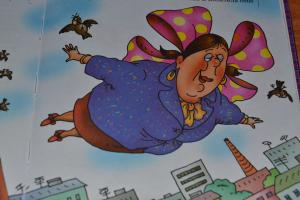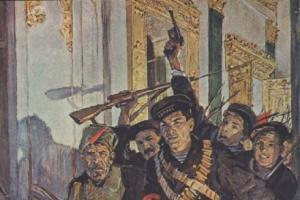Perm writer Sergei Vasilievich Silin Completed by: Dmitry Vaganov
Sergei Vasilievich Silin Born on August 26, 1955 in the Urals, in the Perm region. His mother was a teacher of Russian language and literature, his father worked in the police. The future writer spent his childhood in the village. During my school years I loved to read fairy tales, science fiction, and popular science literature. He was fond of sports - wrestling and skiing. Learned many professions. According to the author himself, he “worked as an ambulance attendant, a machine operator in factories, a teacher of Russian language and literature at school, a teacher in children’s centers, a teacher in children’s camps, a newspaper and radio correspondent, a security guard, a rescuer, and a journalist.”
S. V. Silin graduated from the Faculty of Philology of Perm State University. The first publications appeared in 1982. His fairy tale “Star” was published in the Neva magazine. In the same year, fairy tales were published in the Literary Russia newspaper and the first humorous stories appeared in the Evening Perm newspaper. Today S.V. Silin has more than a dozen authored and collective books. There are several hundred fairy tales and stories published in regional and central periodicals. His works were published in the magazines “Kolobok”, “Koster”, “Pioneer”, “Tram”, “Kucha Mala”, “Yeralash”, “Kukumber”, “Toshka” and others. It is no coincidence that the works of Sergei Silin are included in the collection compiled Lev Yakovlev and representing the avant-garde of modern children's literature - “New Fairy Tales”. It is also known that more than ten fairy tales lie in the desk drawer, waiting in the wings.
Genre Sergei Silin works at the intersection of the genres of humorous fairy tales and science fiction. Literary critic O. Korf speaks “about the whimsicality of the writer’s imagination, about the ability to build a fascinating plot, about the sense of language and about the peculiar intonational hypnosis that does not allow you to tear yourself away from the text and lures you into the depths of such truly serious problems that today’s children rarely encounter on the pages of books."
Creativity Sergei Silin’s creative credo is expressed as follows: “The sources of the plots of many of my fairy tales are Russian folk tales, folklore, and Slavic mythology. I consider it obligatory to have a dynamic plot, cognitive and educational elements in fairy tales. Author’s fairy tales, like folk tales, should convey a healthy attitude towards life, they should not be rude, they should show options for behavior in society and ways to solve life’s problems, leave a charge of good mood and cheerfulness, entertain, and teach you to think.” .
Role An important role in the success of a children's book is played by its design. According to S. Silin, he likes to work “with those illustrators who feel the text and add their own humor to mine. It turns out to be a superbook. It is important for the author and artist to think and feel in harmony.” He notes his work with artists A. Guryev (“Cake on Wheels”) and A. Lukyanov (“The Thief of Golden Apples”) as very successful.
About his work... Sergei Silin says about his work: “I like to be a cheerful writer-storyteller, because in a fairy tale everything is possible. In my fairy tale, even the main characters don’t wash their hands, and cakes on wheels come to birthdays of their own accord. I also like to bring joy to others and surprise myself. Sometimes you come up with something, and then you are surprised: “Well, you have to come up with something like that, the trees are green!.. And where does everything come from?..”.
Sergey Silin
Visiting Sergei Silin
Thank you for your attention!
“Development of the quality of education” - Problems of the emergence of municipal (state) tasks. The school may receive multiple assignments. Key models. How we finance and how we spend funds. Calculation of the regional per capita funding standard for educational institutions. Distance education. How municipalities do not provide funds to schools. Federal State Educational Standard.
“The Effectiveness of Education” - Problems of equality in education. Introduction of new programs. The problem of equality. Consortium of European Research Institutes. International ratings. Efficiency in education. Total costs of education in France. Sociology of education. The concept of "efficiency". Internal efficiency of education.
“Quality of graduate education” - Control measuring materials - 2012. 1. Scheduled and unscheduled inspections according to the State Educational Inspectorate 2. State accreditation 3. State (final) certification of graduates of grades 9 and 11. Comparison of the proportion of participants who did not overcome the minimum limit in compulsory subjects (over 3 years). G(I)A graduates of 9th grade in 2012.
“Improving the quality of education” - Volumes and sources of financing of the Program are carried out: - at the expense of the budget (federal, regional, municipal - 80%; - at the expense of extra-budgetary sources (sponsorship and charitable assistance) - 20%. Creation of a didactic and methodological system for the formation creative and intellectual capabilities of students.
“Improving the quality of education” - Educational and cognitive competencies. Main components of competence. General cultural competencies. Personal self-improvement competencies. Formation of communicative competencies. Rules for the teacher. Introduction of innovation. Ways to develop students' competencies. Key educational competencies.
“Quality of student knowledge” - Quality of student knowledge over 3 years. The quality of knowledge of students in primary schools in the district. Comparative characteristics of the quality of knowledge of students in urban secondary schools. The quality of knowledge of senior students of grades 10-11. in 3 years. A comparative indicator of the quality of knowledge of students in the Gavrilovo-Posad district and region.
There are 12 presentations in total
. Lucky.
In the evening, Antoshka received a scolding from his dad for losing his key, accidentally broke his mother’s favorite cup, forgot what he was assigned in Russian, and couldn’t watch a detective story because the TV was broken.
And just in front of the window the phone rang:
- Antoshka, is that you? It's me, Lucky!
- Hello, traitor! - Antoshka muttered. – And who are you helping now?
But Lucky wasn’t the least bit offended by the “traitor.”
- To an old lady. Can you imagine, she had bad luck all her life! So my boss sent me to her. Tomorrow we will win a million rubles in the lottery, and I will return to you!
- Is it true? – Antoshka was delighted.
“True, true,” answered Lucky and hung up.
That night Antoshka had a dream. It’s as if she and Lucky are dragging four string bags of Antoshka’s favorite tangerines from the store, and from the window of the house opposite, a lonely old woman smiles at them, lucky for the first time in her life.
Tasks
2. Define the text style. Prove it.
3. How did you understand who Lucky is?
4. Explain the meaning of the expression I wasn’t the least bit offended.
5 . What words convey the state of the participants in the dialogue?
6. Write down and sort out 2 verbs with a reflexive suffix.
6. Find and write down verbs with spellings. Explain spellings graphically.
7. Explain the punctuation in the first sentence.
8. What can you say about the role of verbs in this text?
Introductory lesson on the topic “Dialogue”. 5th grade.
. Good forest robber.
Not a minute had passed before a scary-looking man climbed through the window into the room, grabbed a pen and bent over the sheet of paper. Then Marfusha got out from under the bed. Hello! speaks. Who are you? The man shuddered in surprise, but was not afraid. I am Nikodim, the good forest robber. Why are you rewriting my fairy tales? Therefore, Nicodemus answers. I'm tired of being an evil robber! Everyone only expects bad things from me. But I'm kind!
Not a minute had passed before a scary-looking man climbed through the window into the room, grabbed a pen and bent over the sheet of paper. Then Marfusha got out from under the bed.
- Hello! - speaks. - Who are you?
The man shuddered in surprise, but was not afraid.
- I am Nikodim, a good forest robber.
– Why are you rewriting my fairy tales?
“Because,” answers Nicodemus. - I'm tired of being an evil robber! Everyone only expects bad things from me. But I'm kind!
Exercise:
Place punctuation marks in the first text.
Compare two options for writing text. In which version is the text readable and perceived easier? Why?
How did you understand Nicodemus’ action?
Write down words with alternating unstressed vowels at the root, explain the spelling.
Comprehensive text analysis. Integrated lesson of Russian language and literature. 8th grade.
Vladimir Kirshin. Zen, the religion of lazy people.
Having thrown their backpacks under a bush and stretched their backs, the brothers, without hesitation, began setting up fishing rods and preparing bait. Dimka looked busily at Shurik, supposedly checking whether everything was correct, while he himself carefully copied the height of the float and the method of attaching the worm. But in order to plant this very worm, it was necessary to first catch a hook hanging on a long fishing line from somewhere in the sky. Dimka knew how to do it. He deftly, showing off a little, swung the rod, the hook swung away from him, then towards him, Dimka grabbed the fishing line a little higher than the sinker, but the hook spun under his hand and... securely grabbed onto the sleeve of his sweatshirt. Dimka broke out in a sweat: the situation was classic - a bungling fisherman on his own hook... Glancing sideways at Shurik, who was carried away by his gear, Dimka began to carefully untangle the hook from the fabric. The hook was good and did not come off. Baring his teeth and quietly hissing, Dimka pulled it from side to side until he tore it out of his sleeve along with the cotton wool. Suppressing a sigh of relief, he bent over the jar of bait. I chose a tastier worm and put it on a hook...
Shurik forgot about everything in the world. Without taking his loving eyes off the unsightly homemade floats, he impatiently stomped, squatted, stood up again, then suddenly sharply bent over to the rod and - staring predatorily at the animated float - tenderly took the warm bamboo in his hand. Slowly, slowly, barely breathing, he raised his long rod, waited, impatiently moving his lips, for the float to dive deeper into the water, and - pulled! An offensively tiny fish flew into the air like a victorious “Challenger” and, fluttering, fell into the grass. Shurik immediately somehow calmed down, as if he reluctantly pulled it towards him, unhooked it and, without looking at all, strung it on the coucan, and sometimes released it back into the pond to grow up. And everything was repeated all over again.
Tasks
1. Determine the topic and main idea of the text.
2. Title the text.
3. Define the text style. Give reasons for your answer.
4. Describe the characters, on the basis of which you made such a conclusion.
5. What means of expressive speech do you see in the text.
6. Explain the meaning of the words: bait, kukan.
7. Choose synonyms for the words: showing off, unsightly (floats)).
8. make a morphemic analysis of the words: enthusiastic, grinning, victorious.
9. Highlight and explain spelling patterns in suffixes.
9. Graphically indicate the isolated parts of the sentence.
Writer Sergei Silin taught Russian language and literature and worked as a newspaper correspondent. He edited the children's magazine "Prostokvashino", published in "Kolobok", "Tram", "Yeralash", "Murzilka" and other children's magazines.
“His inventions are charming, his tone is confidential and good-natured, his edification is delicate. To these advantages we must also add a sense of humor (a rarity in literature in general),” critics say about the writer.
And Miracle Radio, to be honest, at first I was wary of what I read – some strange fairy tales, in the style of “Scary Stories.” Will children understand, won’t adults judge?!
Then we tried to voice it and... it turned out very cool! The children's sonorous voice, the excellent acting of the adult actors, the music and inter-noise did their job.
(editing and sound engineering by Vera Kuligina)
The stories are funny and instructive

Butterfly bow
The most fun and funny things happen only in kindergarten. Why so? Because real craftswomen work there. And tell a fairy tale. And tie a bow with a bow!
Voiced by Mira Kuligina and Katerina Chaukina.
http://xn----8sbkcu6aemx3b.xn--p1ai/wp-content/uploads/2016/09/Bow-bow-1.mp3
Worm Second
Why do you think there is a worm for fishing? Put it on a fishing rod? In no case! You need a worm to tell jokes! Uncle Vova thinks so. And he's probably right...
Voiced by Dasha Khokhlova, Viktor Kharzhavin and Elena Avdeenko.
http://xn----8sbkcu6aemx3b.xn--p1ai/wp-content/uploads/2016/09/Worm-Second-2.mp3
Grandma with pies
Spelling patterns or pies? What do children think about in class? - Grandmothers know. Grandmothers, in general, know everything. They know how to help a hungry grandson and how to deal with a harmful driver. The grandson usually gets help from the pies, and the drivers from the belt 🙂
Voiced by: Milena Kalinina, Vasily Limonov and Katerina Chaukina.
http://xn----8sbkcu6aemx3b.xn--p1ai/wp-content/uploads/2016/09/Granny-with-pies-1.mp3Miracle Radio – Babu shka with pies (Silin)

The Case of the Ogre
How to deal with a cannibal? - Ruin his acid-base balance. Who can do this? — Little boys who are not afraid of anything, but do not want to give a diary for comments.
Voiced by: Mira Kuligina, Ilya Grednev and Anatoly Mikhasik.
http://xn----8sbkcu6aemx3b.xn--p1ai/wp-content/uploads/2016/09/The-case-of-the-cannibal-1.mp3Miracle Radio – Sl teach with the ogre (Silin)

Cake on wheels
What happens when you don't listen to your mom? - Trouble, that's right. What happens when you don't listen to the RADIO? - You are left without cake! It's a pity, of course, but this is the true truth!
Voiced by Mira Kuligina and Sasha Shishkin.
http://xn----8sbkcu6aemx3b.xn--p1ai/wp-content/uploads/2016/09/Cake-on-wheels-2.mp3Miracle Radio – Cake on wheels (Silin)

Mysterious conversation
If you eavesdrop on other people's conversations, you can hear a lot of interesting and incomprehensible things. Very unclear. And even mysterious. Then you stand and think - what are they talking about?? And in order not to think too much, it’s better not to eavesdrop!
Voiced by: Vita Dolgacheva and Victoria Parfenyeva.
http://xn----8sbkcu6aemx3b.xn--p1ai/wp-content/uploads/2016/09/Mysterious-conversationHRYU-1.mp3H udo Radio – Mysterious conversation (Silin)

Vadya Damn
How to stop blinking? You can negotiate with some wizard or sorcerer. Then... wait for him to wave his magic wand. And... prepare for an air attack of hot pancakes. Brrr. Nothing pleasant. And don't laugh!! No, you definitely need to laugh!
Voiced by: Milena Kalinina, Katerina Chaukina and Vasily Limonov.








